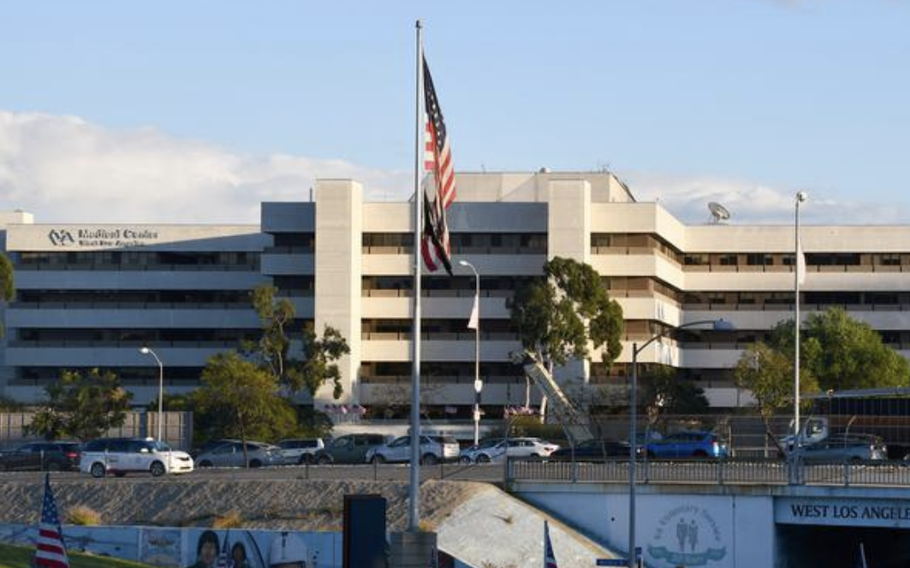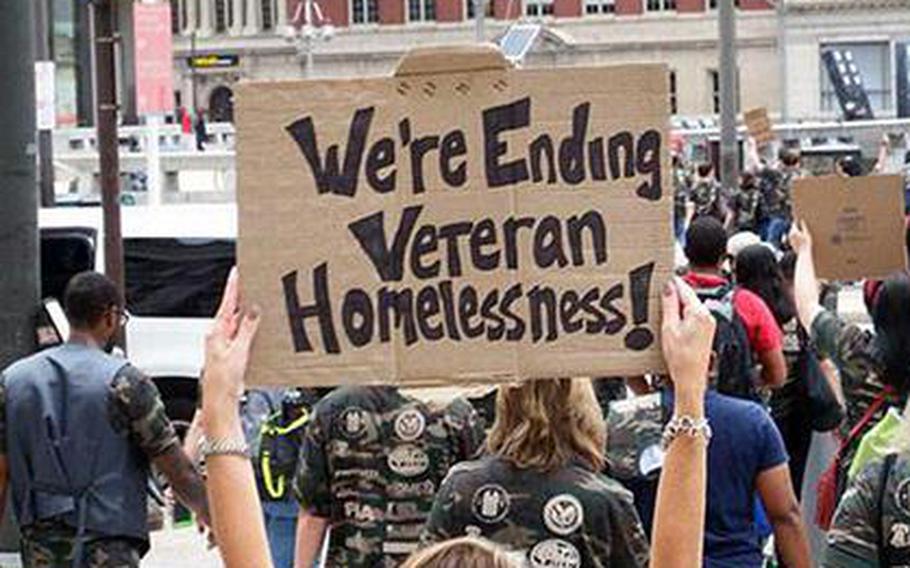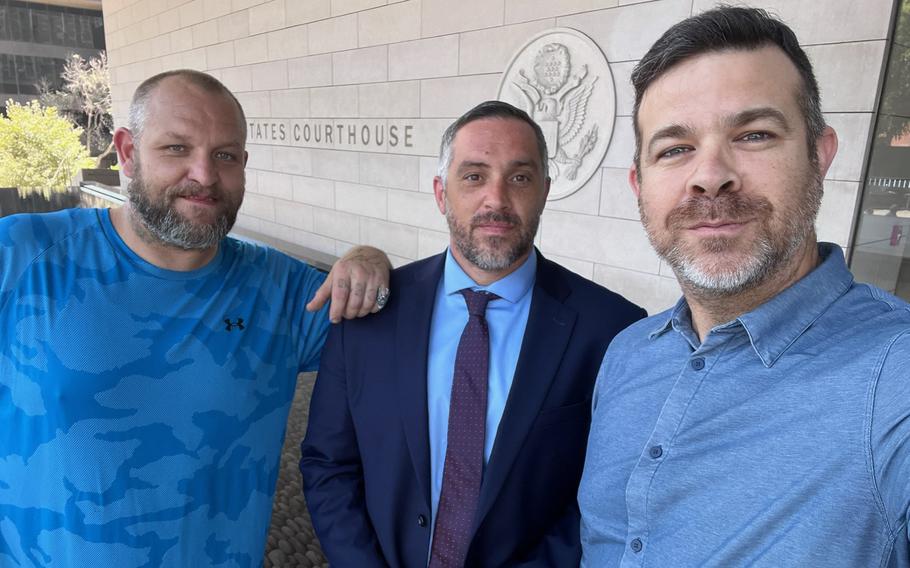
The Department of Veterans Affairs campus in west Los Angeles is shown in February 2022. It is a 388-acre campus that a charity bequeathed to the VA in the 1880s for the purpose of housing war veterans. (Stars and Stripes)
WASHINGTON — The Department of Veterans Affairs must establish hundreds of additional shelter beds within 18 months and build another 1,800 units of subsidized apartments by 2030 after a federal court ruled the agency has failed to comply with an agreement to develop a west Los Angeles campus with housing for disabled homeless veterans.
Judge David Carter issued a 125-page ruling late Friday that ended a month-long trial in a class-action lawsuit against the VA brought on behalf of disabled veterans living on the streets of Los Angeles County or at imminent risk of losing their housing.
The case, heard in U.S. District Court in the Central District of California, was over the future of a 388-acre campus that a charity bequeathed to the VA in the late 1880s for the purpose of housing war veterans. The site is in an affluent section of Los Angeles.
The judge ordered the VA to terminate its lease agreements with commercial businesses operating at the site. They include a parking garage, a college athletic complex, a golf course and other business interests. The VA declined to say Monday how much revenue the agency collects from the leases.
A hearing is scheduled for Sept. 25 that will put a process in place for termination of the leases as well as setting up a blueprint for development of the shelter beds.
Terrence Hayes, the VA press secretary, said the VA has not decided whether it will appeal the court decision.
“We at VA are carefully reviewing the court’s decision and will continue to do everything in our power to end veteran homelessness,” he said.

A federal judge ruled on Sept. 6, 2024, that the Department of Veterans Affairs must establish hundreds of additional shelter beds within 18 months and build another 1,800 units of subsidized apartments by 2030 at a west Los Angeles campus for disabled homeless veterans. (VA.gov)
The ruling orders the VA to develop 750 emergency shelter beds on the campus at a cost of about $100 million, according to court documents.
“Without temporary supportive housing, countless veterans may die on the streets or in shelters while waiting for permanent housing to be built,” Carter wrote.
The judge also ruled the VA needs to build 1,800 units of “permanent supportive housing” by 2030.
Supportive housing provides onsite services for disabled tenants, including mental health care, transportation, legal services and other assistance.
Carter wrote federal courts and veterans have warned the VA that it was not fulfilling its commitment based on a 2016 master plan agreement to develop housing on the west Los Angeles campus for veterans. The campus has 233 VA housing units, with nearly all occupied, according to the VA.
Plaintiffs in the class-action lawsuit include disabled veterans who are homeless and at risk of homelessness, with some suffering from traumatic brain injuries and serious mental illnesses.
“I went to the VA for [post-traumatic stress disorder] treatment and was turned away for services because I had my service animal with me. I stayed on Veterans’ Row,” said Army veteran Rob Reynolds, 35, of Los Angeles, who was formerly homeless.
Veterans’ Row refers to the sidewalk encampments of homeless veterans living in tents just outside the gates of the west Los Angeles campus for lack of housing.
“This is a huge ruling for veterans,” said Reynolds, who served in the military as an infantryman and specialist from 2006-2010.
Reynolds, who suffers from PTSD, said he is 100% disabled and now works as an advocate in Los Angeles for homeless veterans.
“This land originally was donated as a soldier’s home with thousands of veterans housed there until the 1970s, when the VA started leasing it to businesses,” he said. “Roughly the same number of veterans who used to live on that property are now homeless in Los Angeles.”

Rob Reynolds, center, who advocates for homeless veterans, stands outside the federal courthouse in Los Angeles with Iraq war veteran Joshua Petitt, left, and Marine veteran Mike Dowling. (Rob Reynolds)
More than 3,000 veterans are homeless in greater Los Angeles, according to the Department of Housing and Urban Development, which conducts a one-night census each year of homelessness in the United States.
The number is higher than any other metropolitan area in the U.S., but housing advocates have said the annual HUD census fails to represent the actual number of homeless people, including veterans, because many are out of sight — sleeping in vehicles, in parks or staying with friends.
Carter wrote new campus housing will enable disabled veterans to live near the VA Greater Los Angeles Medical Center, which is located on the grounds. A primary reason that veterans seek housing at the campus is for the specialty care at the medical center, he wrote.
Carter mentioned in his decision the situation of 54-year-old Laurieann Wright, a 100% disabled veteran who has a seizure disorder and PTSD connected to a sexual assault during military service. She also suffered a broken neck after leaving the military.
Wright, who is formerly homeless, has a low-income VA apartment that is a three-hour commute from the medical center on the west Los Angeles campus. She said she is unable to make the trip on her own because of the severity of her disabilities.
There are 535 permanent units under construction at the site, according to the VA. But Carter expressed concern the units will not be completed by the 2030 deadline that he imposed.
“The term ‘veteran homelessness’ should not be in the American vocabulary,” said Mark Rosenbaum, attorney with Public Counsel representing the veterans in the class-action suit. “The ruling holds the VA accountable for its failures [in addressing veteran homelessness] and ensures that its west LA campus will finally serve its true purpose as a home for veterans.”
The site is next to Brentwood, a wealthy suburb of Los Angeles that is about 12 miles from the city’s downtown.
The judge said the VA has a history of leasing the land to commercial interests rather than developing housing for disabled veterans.
“The West LA VA Campus generated millions of dollars from this leasing policy that provided little direct benefit to veterans,” Carter wrote. “The VA must remediate its mishandling of this resource so that the land may once again be available for its intended purpose: the housing of veterans.”